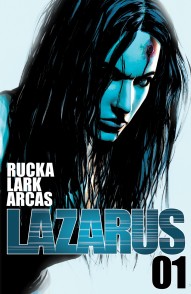A sci-fi thriller with a mafia twist is the latest in a series of comics that measure the disparity between rich and poor.
In the last few months, mainstream comics have been developing quite the social conscience. While DC has been giving us both sides of the coin in The Movement and The Green Team, to mixed results, Occupy Comics has been putting their money where their mouths are, actually funding the Occupy Movement with the profits of its sales. Lazarus is not specifically about the social injustices about the divide between the 1% and the 99%, but it does depict a world where ownership has gone wild, and the former camp are now the elite ruling class.
In the not-too-distant dystopian future, a handful of families control all of the resources, and they protect those possessions with deadly force. They do so at the expense of the Waste, the general populace struggling in the vast remainder of the world. Each family has a protector, and Forever guards the Carlye family by any means necessary. The story begins with Forever being shot dead defending the family home, and things just get worse for her after that.
This slick thriller with sci-fi leanings is a cool affair from Greg Rucka, but perhaps a little too cool at times. The concepts in Lazarus are intriguing ones, and Rucka spends much of this issue setting out the rules of this world. Many of the concepts are familiar ones, especially the idea of an elite human weapon beginning to doubt her place in the world. The script keeps us at arm’s length for the most part, with only Forever’s occasional concerns allowing the reader to latch onto her character. Yet the inevitability of Forever’s changes after her brushes with the great unwashed now set in stone, one of the hooks of the series will be watching Forever’s growing awareness of self.
Michael Lark’s mostly action packed art is the real strength of the issue. There’s several pages that are completely textless, perfectly capturing the idea of visual storytelling in a way that only sequential art can provide. Santi Arcas uses a minimal colour palette, mostly blues and greys with lots of splashes of very violent red. While it is stunning to look at as individual pieces, the art also increases this sense of distance from the audience.
This is ultimately the hurdle that Lazarus has to overcome, presenting a series of overly familiar situations without sufficient reasons to care about the fairly standard characters found within. The opening hook is an interesting, albeit violent, one and sets the tone for this first issue. There are enough concepts here for Rucka to run with throughout this ongoing, which is why a second look is justified next month, yet this first issue does little to distinguish itself from the plethora of similar books on the market.
Agree or disagree? Got a comment? Start a conversation below, or take it with you on Behind the Panel’s Facebook and Twitter!
If you are an iTunes user, subscribe to our weekly podcast free here and please leave us feedback.












1 pings
[…] Richard Gray, Behind the Panels: “This slick thriller with sci-fi leanings is a cool affair from Greg Rucka, but perhaps a little too cool at times. The concepts in Lazarus are intriguing ones, and Rucka spends much of this issue setting out the rules of this world. Many of the concepts are familiar ones, especially the idea of an elite human weapon beginning to doubt her place in the world. The script keeps us at arm’s length for the most part, with only Forever’s occasional concerns allowing the reader to latch onto her character. Yet the inevitability of Forever’s changes after her brushes with the great unwashed now set in stone, one of the hooks of the series will be watching Forever’s growing awareness of self.” (3.5/5) […]